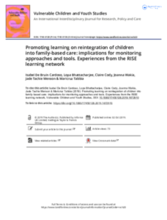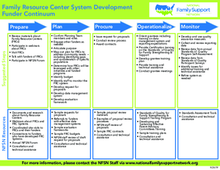This page contains documents and other resources related to children's care in the Americas. Browse resources by region, country, or category.
Displaying 151 - 160 of 566
This exploratory study gathered perspectives from legal professionals regarding the challenges faced by youths in out of home care and their families and necessary supports to promote successful reunification.
The authors of this study systematically compared parenting interventions offered in 12 maternal substance use treatment programs in one Canadian province with those described in the research literature.
The present study is the largest and most rigorous study to date on the effects of being appointed a Court Appointed Special Advocate (CASA) on permanency outcomes of children in foster care.
This article from the Vulnerable Children and Youth Studies journal presents lessons learned from a RISE Learning Network learning project focused on monitoring (M&E Learning Project) and aimed to generate understanding of approaches and tools that could effectively monitor children and families’ reintegration outcomes. The mid- and end-term reviews of the M&E Learning Project have captured lessons learned on how practitioners can approach monitoring of reintegration to mainstream it into their programme cycle.
On Sept. 19, the Casey Foundation hosted a webinar sharing data and lessons from the first phase of Learn and Earn to Achieve Potential (LEAP)™, an effort to boost employment and educational opportunities for young people ages 15 to 25 who’ve experienced homelessness or been involved with public systems.
This guide from the National Family Support Network provides a brief outline of suggested steps for funders to invest in Family Resource Centers, including resources from the National Family Support Network for each step.
Using a case study approach, this article will review a pre-college summer program designed specifically for youth transitioning from foster care, the National Social Work Enrichment Program (NSEP).
This series—which begins with a focus on schools— exposes the harm of punishing parents instead of addressing the root causes of child welfare involvement in the U.S.
The purpose of this commentary is to reflect on the utility and possible application of the suggestions and study designs in this special issue to real‐life intervention studies in dynamic context settings.
This study examined stakeholder views on the key elements and challenges of youth participation in policy advocacy in the context of a US multi-state current and former foster care youth coalition.




